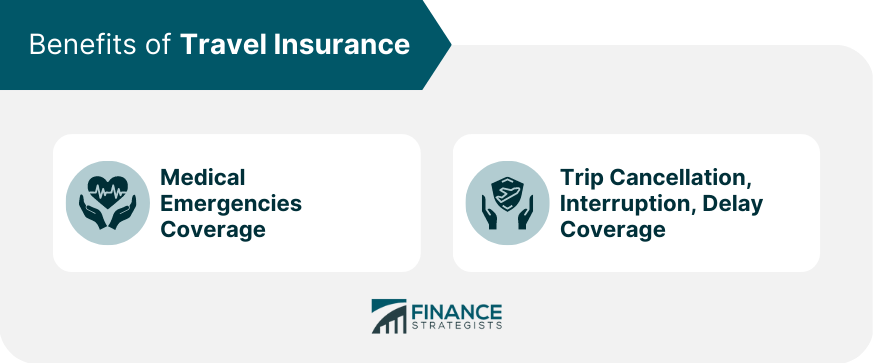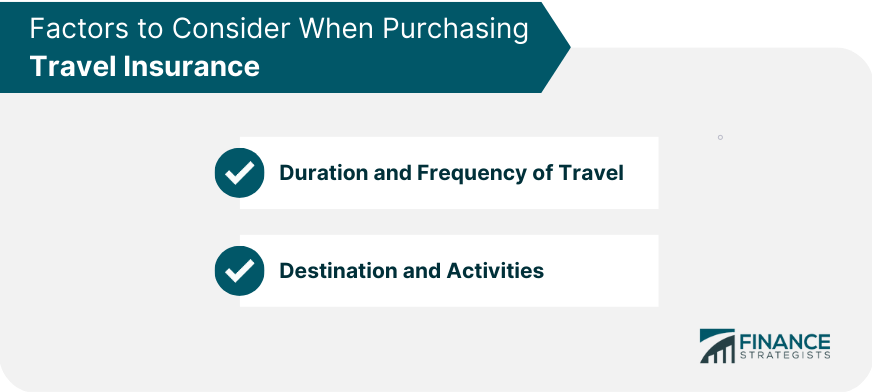Travel insurance is a type of policy designed to cover various risks and losses associated with traveling. It can provide financial protection for unforeseen events that may occur before or during a trip. Travel insurance policies often cover a wide range of incidents, such as medical emergencies, trip cancellations, lost luggage, and more. By purchasing travel insurance, individuals can have peace of mind knowing they are protected against potential financial setbacks while exploring new destinations. Travel insurance is crucial for mitigating risks that can occur during a trip. It provides a safety net for travelers, ensuring that they have financial support when faced with unexpected situations. Having travel insurance can also alleviate stress and anxiety associated with traveling, especially for those venturing to unfamiliar destinations or participating in high-risk activities. In addition, it can help travelers avoid the burden of paying for costly medical treatments or losing non-refundable deposits due to unforeseen cancellations. One of the primary reasons to obtain travel insurance is to cover potential medical emergencies that may occur during a trip. Medical coverage can help pay for hospital bills, doctor visits, and even emergency evacuation if needed. In some cases, travelers may require emergency transportation back to their home country for specialized treatment. Travel insurance can cover the cost of this evacuation, which can be extremely expensive if paid out-of-pocket. Trip cancellation, interruption, and delay coverage are essential components of travel insurance. These policies protect travelers from financial losses due to unforeseen events that may disrupt their travel plans. Trip cancellation coverage reimburses travelers for non-refundable expenses if they need to cancel their trip before departure due to covered reasons. Trip interruption coverage provides reimbursement for additional expenses incurred if a trip is cut short, while trip delay coverage compensates for expenses such as accommodations and meals if a traveler is delayed for a specified period. When choosing a travel insurance policy, it's essential to consider the length and frequency of your trips. Frequent travelers or those planning extended trips may benefit from purchasing an annual multi-trip policy, which covers multiple trips within a year. Annual multi-trip policies can be more cost-effective than purchasing individual policies for each trip. However, they may have limitations regarding the maximum duration of each trip, so it's crucial to review the policy details carefully. The destination and activities planned during a trip can significantly impact the type of travel insurance needed. Travelers heading to remote or high-risk locations may require more comprehensive coverage, including medical evacuation and emergency assistance services. Similarly, travelers participating in adventure sports or other potentially dangerous activities should ensure that their chosen policy covers these specific pursuits. Some policies may exclude certain activities or require additional coverage to be purchased. Before purchasing travel insurance, it's crucial to compare different providers to find the best policy for your needs. This involves researching various companies, reviewing their coverage options, and evaluating their customer service and claims processes. By comparing travel insurance providers, travelers can gain a better understanding of the policies available and make an informed decision about which policy is best suited to their individual needs and preferences. When selecting a travel insurance policy, it's important to carefully review the coverage options available. Travelers should ensure that the policy provides adequate protection for their specific needs, such as medical coverage, trip cancellation, and baggage loss. In addition, it's crucial to review the policy's limits, deductibles, and exclusions. These factors can significantly impact the level of protection provided by the policy. Travelers should select a policy that offers sufficient coverage limits and reasonable deductibles, while also being mindful of any exclusions that may apply to their specific situation. Filing a travel insurance claim can be a daunting task, but understanding the process can make it less overwhelming. Familiarizing oneself with the required steps and documentation needed can help ensure a smoother experience when submitting a claim. The first step in the claims process is to notify the insurance provider as soon as possible when an incident occurs. Timely communication is essential, as some policies have strict deadlines for submitting claims. When filing a travel insurance claim, it's crucial to gather all necessary documentation to support the claim. This can include receipts, invoices, medical records, and any other relevant paperwork that demonstrates the expenses incurred as a result of the covered event. Travelers should also provide a detailed written account of the incident, including dates, locations, and any other pertinent information. By providing thorough documentation, travelers can help expedite the claims process and increase their chances of receiving a favorable outcome. The COVID-19 pandemic has significantly impacted the travel insurance industry, prompting changes in coverage and policy offerings. As travel restrictions and health concerns continue to evolve, insurance providers have adapted their policies to address the unique challenges presented by the pandemic. Many travel insurance providers now offer policies that include coverage for COVID-19 related expenses, such as medical treatment, quarantine, and trip cancellations due to the virus. However, it's essential to carefully review each policy's specific coverage and exclusions related to COVID-19. Travel insurance is an essential component of any travel plan, providing financial protection and peace of mind in the face of unexpected events. By carefully considering factors such as duration, destination, and activities, travelers can select the best policy for their needs. Understanding the claims process and staying informed about COVID-19 related coverage can further enhance the benefits of travel insurance, ensuring that travelers are well-prepared for any challenges that may arise during their journeys.What Is Travel Insurance?
Benefits of Travel Insurance
Medical Emergencies and Evacuation
Trip Cancellation, Interruption, and Delay

Factors to Consider When Purchasing Travel Insurance
Duration and Frequency of Travel
Destination and Activities

How to Choose the Right Travel Insurance Policy
Comparing Travel Insurance Providers
Evaluating Coverage Options
How to File a Travel Insurance Claim
Understanding the Claims Process
Gathering Necessary Documentation
Travel Insurance and COVID-19
Conclusion
Travel Insurance FAQs
Travel insurance is a type of insurance that provides coverage for unexpected events that may occur while traveling, such as trip cancellations, medical emergencies, lost luggage, and more.
It depends on your travel plans and personal circumstances. If you're traveling internationally, have a pre-existing medical condition, or are going on an expensive trip, travel insurance can provide valuable protection and peace of mind.
Travel insurance can cover a wide range of events, including trip cancellations, trip interruptions, medical emergencies, evacuation and repatriation, lost or stolen luggage, and more. Coverage varies depending on the policy you choose.
When choosing a travel insurance policy, consider your destination, length of travel, activities planned, and personal circumstances such as age and pre-existing conditions. Read policy details carefully and compare coverage and prices from multiple providers.
Yes, you can usually purchase travel insurance after booking your trip, but some benefits may not be available if you wait too long. It's best to purchase travel insurance as soon as possible after booking your trip to ensure you have the most comprehensive coverage.
True Tamplin is a published author, public speaker, CEO of UpDigital, and founder of Finance Strategists.
True is a Certified Educator in Personal Finance (CEPF®), author of The Handy Financial Ratios Guide, a member of the Society for Advancing Business Editing and Writing, contributes to his financial education site, Finance Strategists, and has spoken to various financial communities such as the CFA Institute, as well as university students like his Alma mater, Biola University, where he received a bachelor of science in business and data analytics.
To learn more about True, visit his personal website or view his author profiles on Amazon, Nasdaq and Forbes.











